
Travel has long been viewed as an activity for those privileged with time and money — a bonus, if a person happens to be able to take time away from work or their other day-to-day responsibilities.
A growing body of evidence supports the theory that travel isn’t just for recreation. This evidence suggests that when it comes to the mental health of those recovering from trauma, mental illness or addiction, travel — a step outside your comfort zone — can have undeniable benefits on mental health.
The Need for Travel
Even as more people begin to understand the health benefits of travel, it seems that America is currently undergoing a vacation epidemic. As people accrue PTO and vacation time at their jobs, it doesn’t seem to be making a difference on their opportunities to take advantage of the health benefits of travel.
A report compiled by the job information site Glassdoor found that the average American worker only takes half of their available paid time off in a given year. For most people, work is a significant source of stress and anxiety, yet people continue to choose to forgo travel in favor of that stress. Less clear are the reasons why.
The Top 5 Benefits of Travel on Mental Health
It’s generally agreed upon that most people — Americans especially — don’t travel enough. Here are five reasons why that’s a problem.
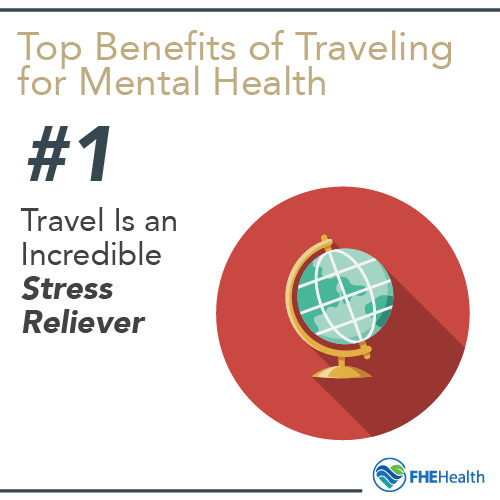 1. Travel Is an Incredible Stress Reliever
1. Travel Is an Incredible Stress Reliever
In fact, cortisol, the steroid hormone released when you experience stress, has been linked to worsening mental illness. According to the National Alliance on Mental Illness (NAMI), elevated stress levels can worsen conditions like obsessive-compulsive disorder (OCD) and schizophrenia.
Stress has also been linked to the development of conditions like generalized anxiety disorder (GAD), depression and suicidal behaviors. Many of the most effective therapeutic techniques involve helping patients cope with daily stressors. Even if they aren’t directly related to a patient’s mental illness, in many cases, their presence can cause that illness to flare up or worsen.
Travel has been suggested to reduce stress by giving people a break from stressors like work, household responsibilities, bills and family conflict. Even if it’s a short trip for a weekend, it can be enough to give us time to refresh and return to daily life with new energy.
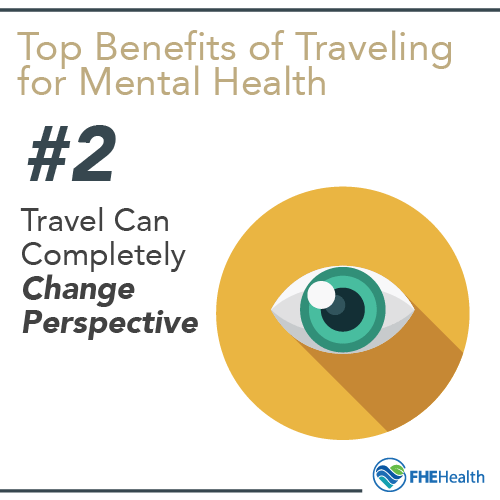 2. Travel Can Completely Change Perspective
2. Travel Can Completely Change Perspective
Waking up every morning in the same place and doing the same thing every day can put you in a rut, and that’s without the presence of significant stressors in your daily life. Visiting a new location, getting fresh air, relaxation, sun and other healthy, natural interactions can change the way you see the world and give you the fresh perspective needed to cope with life’s challenges in a more constructive way. As the old axiom goes, if the only tool in your box is a hammer, every problem will look like a nail. If you broaden your horizons, your new perspectives will let you look at challenges from new angles and give you a new appreciation for how to face your daily obstacles!
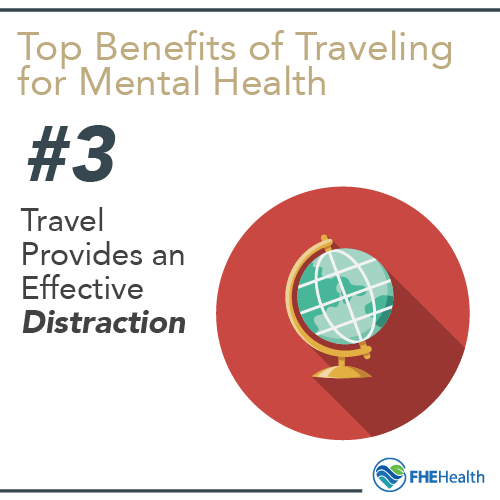 3. Travel Provides an Effective Distraction
3. Travel Provides an Effective Distraction
Sometimes, a boost in mental health is as simple as focusing on something else for a while. It seems simple — even overly so — but for many people, having the freedom to explore a city, relax by the water, or visit with friends in new surroundings can offer a much-needed distraction from the negative aspects of daily life.
Take grief, for example. People who have experienced the loss of a loved one can attest that grief can feel all-consuming. That’s not to say that travel will completely eliminate feelings of grief and mourning, but it may take the edge off, allowing the mind to keep from fixating on negative emotions over which they have no control.
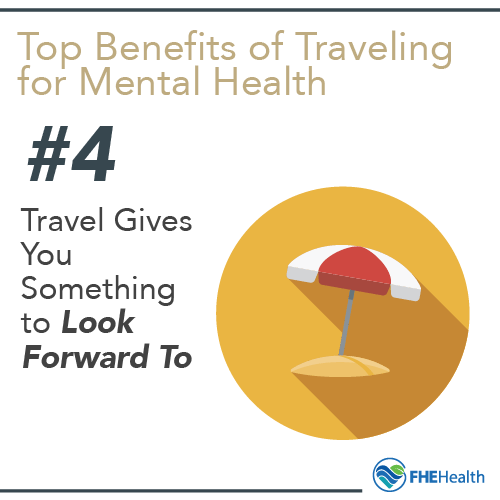 4. Travel Gives You Something to Look Forward To
4. Travel Gives You Something to Look Forward To
It’s clear that travel can provide an emotional boost while you’re on vacation. Some studies show that the benefits of travel to your mental health aren’t limited to the duration of a trip.
People look forward to a trip in the same way that they look forward to the delivery of an online purchase, research shows. The anticipation in the weeks leading up to a vacation can offer a sustained boost in the chemicals associated with happiness.
The same applies to the period after travel. The memories and happy thoughts from a trip can benefit mental health, almost as much as the trip itself.
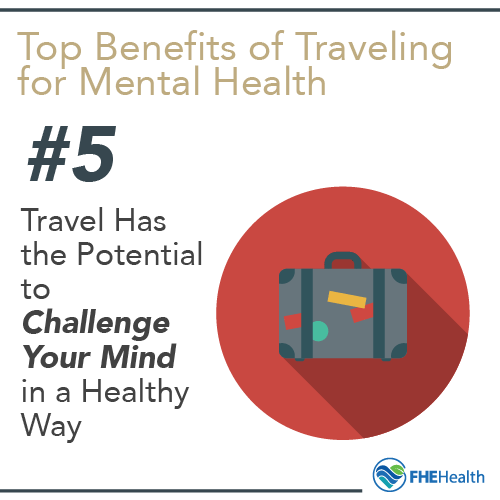 5. Travel Has the Potential to Challenge Your Mind in a Healthy Way
5. Travel Has the Potential to Challenge Your Mind in a Healthy Way
Travel is about taking a few steps away from the familiar and challenging yourself to try new things. While this may spark worry in some, it’s generally a good thing to try new foods, visit new places and see new things. Willfully exposing yourself to things outside your comfort zone is a sign of emotional maturity, an inner strength that can boost your ability to cope with grief and trauma in a healthy way.
Travel Doesn’t Come Without Its Risks
The health benefits of travel are undeniable — but not universal. While many people suffering after a life-changing event may feel an unspeakable boost from getting out of their comfort zones, others will feel more stress than they would in the comfort of their own homes.
This is because travel isn’t always as stress-free as we’d like it to be, and where there’s stress, there are triggers for relapse for many people in recovery from mental and behavioral illnesses.
There are a few risks of travel, especially for those with high risk for mental illness and addiction.
- Travel may come with triggers like crowds, air travel and unfamiliar places. For some people, these aspects of travel cause a vacation to be more stressful than stress-relieving, worsening serious mental illness, or posing the risk of a relapse.
- Health insurance may be limited during travel, especially overseas. The potential benefit of a vacation may not be worth the risk of being stranded without necessary care.
- People suffering from mental illness may also be left without consistent or reliable access to the medications they need on a trip. In the case of a medical emergency, this can make potentially life-saving treatment harder to access.
Make the Decision That’s Right for You
The psychology of traveling is powerful, and there’s potential for a wide range of physical and mental health benefits that come with the chance to explore new tastes, sights and sounds.
With this in mind, not everyone will experience these benefits. If you have a history of addiction, mental health conditions, or something similar, please talk to a medical professional who knows you well about whether or not it’s a good idea to go on vacation. If you decide to go, make sure you have everything, like emergency plans and access to your medication, planned out long in advance.
To learn more about travel and mental health, contact FHE Health today.






